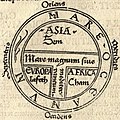Semites
Semites is a word that was used for people who speak a Semitic language like Arabic or Hebrew. Scientists no longer use the words Semites or Semitic peoples, but they still speak of Semitic languages.[1][2][3][4][5]
Origin
The word Semite was taken from Shem, a son of Noah in the Genesis (chapters 6-11). It was first used in the 1770s by German professors at the University of Göttingen.[6]
Semites Media
This T and O map, 1472, from the first printed version of Isidore of Seville's Etymologiae, identifies the three known continents as populated by descendants of Sem (Shem), Iafeth (Japheth) and Cham (Ham).
1879 statute of the Antisemitic League, the organization which first popularized the term
Related pages
References
- ↑ Liverani1995, p. 392.
- ↑ On the use of the terms “(anti-)Semitic” and “(anti-) Zionist” in modern Middle Eastern discourse, Orientalia Suecana LXI Suppl. (2012) by Lutz Eberhard Edzard Archived 2017-10-11 at the Wayback Machine: "In linguistics context, the term "Semitic" is generally speaking non-controversial... As an ethnic term, "Semitic" should best be avoided these days, in spite of ongoing genetic research (which also is supported by the Israeli scholarly community itself) that tries to scientifically underpin such a concept."
- ↑ Anidjar 2008, p. (Foreword).
- ↑ Anidjar 2008, p. 6.
- ↑ Lewis, Bernard (1987). Semites and Anti-Semites: An Inquiry into Conflict and Prejudice. W W Norton & Co Inc. ISBN 978-0393304206.
The confusion between race and language goes back a long way, and was compounded by the rapidly changing content of the word "race" in European and later in American usage. Serious scholars have pointed out–repeatedly and ineffectually-‑that "Semitic" is a linguistic and cultural classification, denoting certain languages and in some contexts the literatures and civilizations expressed in those languages. As a kind of shorthand, it was sometimes retained to designate the speakers of those languages. At one time it might thus have had a connotation of race, when that word itself was used to designate national and cultural entities. It has nothing whatever to do with race in the anthropological sense that is now common usage. A glance at the present‑day speakers of Arabic, from Khartoum to Aleppo and from Mauritania to Mosul, or even of Hebrew speakers in the modern state of Israel, will suffice to show the enormous diversity of racial types.
- ↑ Baasten, Martin (2003). "A Note on the History of 'Semitic'". Hamlet on a Hill: Semitic and Greek Studies Presented to Professor T. Muraoka on the Occasion of His Sixty-fifth Birthday. Peeters Publishers. p. 57–73. ISBN 9789042912151.
+{{{1}}}−{{{2}}}
